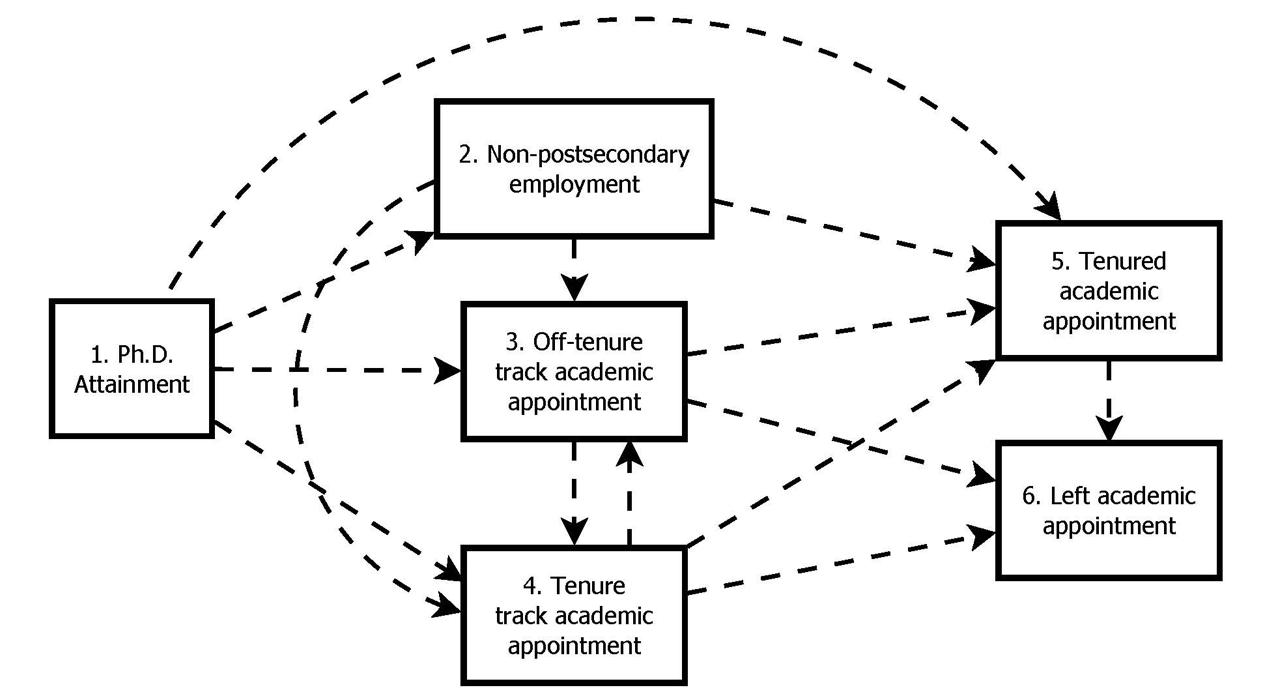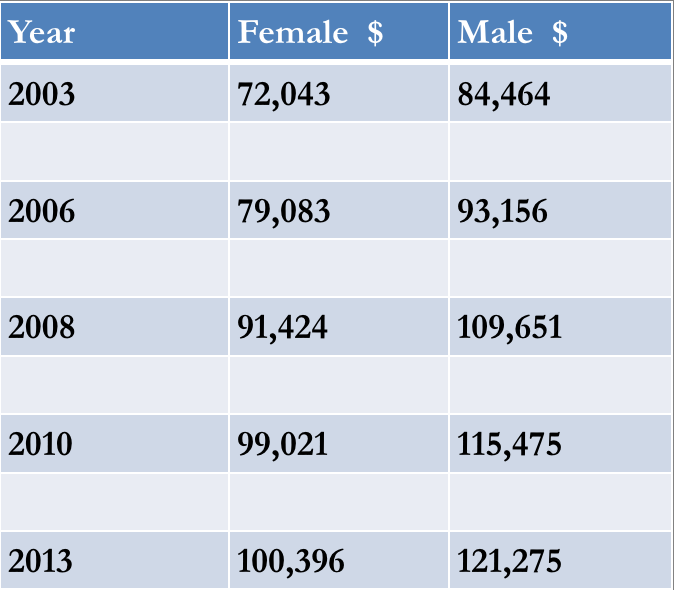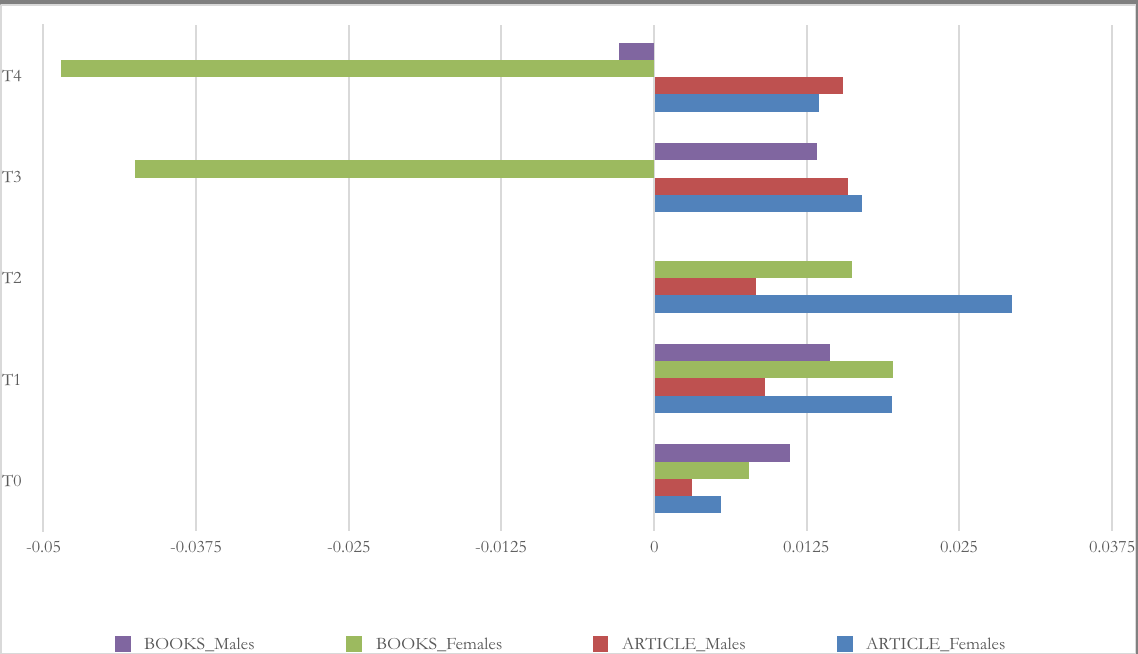New research suggests limited role for gender in predicting whether new Ph.D.s will get
issues, favoring men.
tenure-track jobs, but notable differences on pay and other
May 1, 2017
To what degree does gender impact one's career trajectory in the 10 years after earning a Ph.D.? While the majority of recent studies on the issue have found that women have a harder time earning tenure-track professorships and tenure than do their male counterparts, some studies also suggest that women are now playing on a level field with men -- or even possess some advantage.
A paper presented Sunday at the annual meeting of the American Educational Research Association examining the career paths of recent Ph.D.s finds there’s no strong, comprehensive evidence of gendered paths to tenure during the first decade after degree completion. Scholarly publications and activities, such as research, and a postdoctoral appointment in the years following degree completion were the most important factors in getting an tenure-track job for both men and women.
At the same time, the paper suggests that women do earn lower salaries than men and take longer to complete their doctoral degrees. It also says that important gender-based differences in men’s and women’s career trajectories may still exist in the second decade after degree completion, and that this period merits further study.
“Although the movement out of academia by gender was not statistically significant, our data showed that more women move out of the education sector than male peers,” the paper says. “Additional follow-up with these respondents in their second decade after degree completion may provide additional insight. Perhaps it takes longer to see the effects for women who experience challenge in dual roles or perceive a lack of collegial support. Whether the leaky pipeline is a function of lack of confidence, self-preservation, or women acknowledging their self-worth by pursuing alternate careers that better recognize and value their talents may well be a combination or interaction of these and other factors.”
The paper, which used data from 2003 to 2013 from the federal Survey of Doctorate Recipients concerning 2,350 Ph.D.s, was written by Karen L. Webber, associate professor of higher education at the University of Georgia, and Manuel González Canché, assistant professor of higher education at Georgia. Among other questions, the researchers considered how changes in a Ph.D. holder’s academic (number of publications, teaching experience, postdoctoral appointments) and individual demographic characteristics (race, marital status, children) over time affected movements between different kinds of academic and nonacademic jobs. They also looked for evidence that gender might play a role in predicting whether Ph.D.s got tenure-track appointments.

Source: Webber and González Canché
For their analysis, Webber and González Canché identified all respondents to the 2003 Survey of Doctorate Recipients who completed their doctorates from 1999 to 2003 and who potentially entered an academic position within five years of graduation. (Although some take longer than five years to enter a faculty position, this time frame captures the majority of academic entrants, the study says.) Recognizing that it’s “very possible” faculty members will move across institutions or job types during their careers, the researchers developed four categories of initial employment: non-postsecondary appointment, academic off tenure track, academic tenure track, or tenured academic.
“There is little empirical research to date that captures the ‘dynamic nature’ of the academic trajectories of doctorate holders and how changes in their professional characteristics can be updated across time to explain movements between categories, including the decision to leave the academic profession,” the paper says. “The ultimate goal of this research is to provide evidence of differences in the influence of predictors for tenure-related appointments in the academic trajectories of female and male faculty members.”
Approximately 70 percent of the survey respondents were born in the U.S. Thirty-seven percent were ethnic minorities. About 72 percent earned their doctorates from a major research institution (R1 in the Carnegie Classification of Institutions of Higher Education). More than half were working in education by 2003, and 14 percent completed a postdoc appointment in the decade following graduation.
Sixty-nine percent of recipients were married at degree completion, jumping to 81 percent by 2013. In 2003, nearly 28 percent were employed at an R1, but that share decreased to 20 percent by 2013.
Findings
Women were a year older at degree completion than men, or 37 compared to 36. Women also took longer to complete their degrees (9.2 years compared to 8.5 years) and earned significantly lower salaries than men ($72,043 vs. $84,464 in 2003 and $100,396 vs. $121,275 in 2013).

Across the sample, some 360 participants left the academy within a decade: 160 women and 200 men. Gender had no significant influence on mobility in or out of academe, but a slightly larger share of women moved out of academe than men (about 7 percent vs. 6 percent).
Number of scholarly publications, having a postdoc and salary were significant factors in women’s likelihood of taking an academic position versus working outside academe soon after degree completion. Higher involvement in research, teaching, administration and assistance with computers and technology increased one’s likelihood of remaining in an academic position over time.
In terms of discipline, women in the physical sciences, biology and agricultural sciences and engineering were significantly less likely to take jobs or remain employed in academe compared to peers in the social sciences. (Some of this may be attributable to the prevalence of postdocs in the natural sciences.)
Women who had published articles were not significantly more likely to have a tenured or tenure-track appointment than a non-tenure-track appointment early in their careers, but the difference became significant over time (the authors divide the decade after Ph.D. completion into five different time periods, denoted by "T" in the chart below).
Articles and book publications were positively associated with the likelihood of holding a tenure-related appointment within the first six years after academic appointments for both men and women. In the eighth and 10th years, book publications had a negative correlation for women, and in the 10th year, book publications also became negative for men. The effect of article publications was always positive regardless of gender.

Results also showed that those who took longer to earn a doctorate were less likely to receive a tenure-related position, and U.S.-born recipients had a higher likelihood of receiving a tenure-related position compared to foreign-born peers.
Married women were less likely than single or divorced women to have a tenure-related position late in the decade studied.
Similar to findings for women, male recipients in psychology, biology and agriculture, and the physical sciences were less likely to receive and remain in a tenure-related appointment compared to peers in the social sciences.
“We acknowledge the positive nature of our findings, hoping that gender differences may be waning in academia,” the paper says. “This may be particularly true for doctoral recipients who are assumed to seek employment that synergizes in a long-term career.”
The authors warn, however, that some gender differences do exist, and further study is warranted. Since marriage does not become a significant contributor for women until about eight years after degree completion, it says, “following these recipients into their second decade after degree completion may yield more insight into possible gender effects.” They cite a study suggesting that even if gender differences no longer exist in entry-level academe, they exist later on, for example.
Over all, though, for both men and women, having journal publications was by far the most important contributor to career movement over the decade following degree completion. “Our collective findings herein are somewhat consistent with those who found no gender difference or women with higher citation scores and that differences in younger generations of researchers overall have disappeared in this first decade after degree completion," the new paper says. "Perhaps recent female doctoral recipients have accumulated strong and satisfactory experiences as undergraduate and graduate students, and collectively these experiences and changing social and organizational systems are providing women with self-efficacy that contributes to success in academia.”
In most models, ethnicity was not a significant contributor to early career success within academe. Activities related to teaching and research were also important in terms of securing an academic position, but the magnitude was different for men versus women. Three years after degree completion, teaching and research activities were significant predictors for women, but only teaching activities were found to be significant for male peers. Six years after degree completion, teaching remained important for both men and women, but research became a stronger -- and significant -- predictor for men, the paper says.
In 2006, women who held a management/administrative position were more likely to remain in academia than depart to business and industry or government work. Why? “The more collaborative environment of administration and lower emphasis on publication may be perceived as a more positive work environment," according to the paper.
Across the decade, degree recipients from engineering were more likely to take a position outside the education sector than those in the social sciences, the paper says. This finding also held true, to a somewhat lesser degree with physical sciences, biology and agricultural sciences.
Implications
Despite some of her findings, Webber said via email that it’s important not to abandon gender-equity efforts at departmental, institutional or national levels because there's too much evidence of unconscious biases that enable subtle discrimination to do so. “I am happy that in this set of data we did not find huge gender differences in some areas of academic work, and hopeful that we will find evidence of even fewer differences as we go forward," she said. "However, we did find some areas of gender difference, so we are not completely out of the woods yet.”
If new female Ph.D.s come out of their doctoral programs “on par with male peers, great!” Webber added. But “then I wonder what will happen when they begin to think about pregnancy and raising children. … So we must continue to monitor for equity -- not only in salary but also in all aspects of academic work (amount of time devoted to teaching, research, administrative service, etc.).”
Susan Chen, an associate professor of economics at Illinois State University, co-authored a recent paper suggesting that female economists are less likely to be tenured, compared to male peers, and less likely to remain in academe eight years after earning their Ph.D.s. She said that she wished could share in Webber’s and González Canché’s "positivity" about gender’s effect, or lack thereof, on early academic careers, but that she had some serious methodological concerns about their paper. For example, she said, journal publications matter in personnel decisions not only in quantity but in quality, and across disciplines. Some fields value external grants and others don’t. And perhaps marital status is not a significant factor until late within the decade studied, she added, because sample women got married later.
“I think the bottom line is that the general gender bias still exists based on their study -- for example, salary and year to degree,” Chen said.
Wendy Williams, professor of human development at Cornell University, and Stephen Ceci, the Helen L. Carr Professor of Developmental Psychology at Cornell, together have questioned the persistence of gender bias in the sciences, including in a widely cited paper suggesting that women candidates are actually favored two to one over men for tenure-track positions in STEM. Their work is also cited throughout the new paper, which Ceci called “the latest evidence showing that transitions from hiring through tenure in the academy are basically gender neutral,” albeit with some field-specific effects.
“Sure, there are areas in which women’s outcomes are not quite as salutary as men’s, but there are areas where the reverse is true, too,” he said. Taking their full modeling into account, “one is struck by how gender-fair the picture is in the 2003-2013 waves of the [survey] data. Number of publications was strongly predictive for women as well as men.”
Mounting evidence shows that historical gender discriminatory hiring and tenure “is not currently true and it appears not to have been true for a couple decades,” Ceci added. Going forward, it'll be “interesting to unpack some of these findings to examine fine-grained differences," such as field-specific outcomes for various type of journals and citations, reasons for leaving given fields, salary differences in new jobs, or whether the seemingly positive ethnic hiring data can be confirmed with more data.


Nenhum comentário:
Postar um comentário